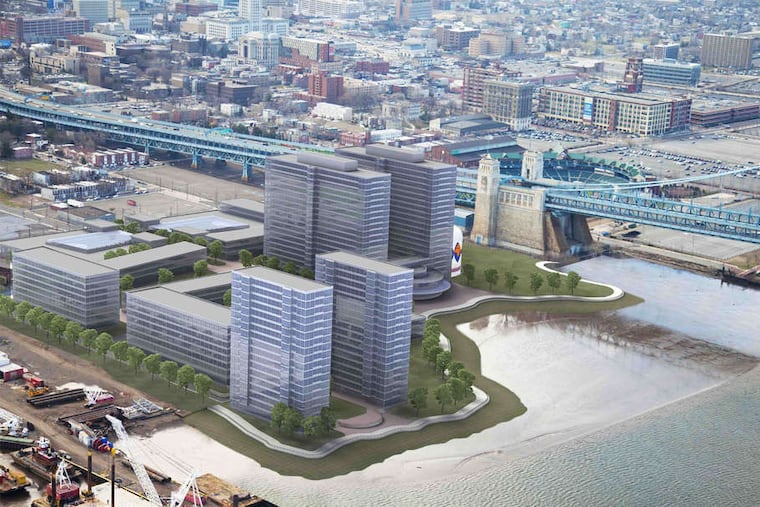Developer wants to build a World Trade Center in Camden
A development firm whose plan to build a World Trade Center in Philadelphia was squashed two years ago announced Monday that it would take the $700 million proposal to Camden's waterfront.

A development firm whose plan to build a World Trade Center in Philadelphia was squashed two years ago announced Monday that it would take the $700 million proposal to Camden's waterfront.
Waterfront Renaissance Associates released a proposal today to erect the 2.3-million-square-foot Greater Philadelphia World Trade Center at the site of the demolished Riverfront State Prison. The now-vacant area would become a 16-acre center for international trade, technology development, retail, and housing in the struggling city, said Martin Schiffman, managing partner of WRA.
"If you follow the history of the organization over 40 years, the primary goal is to increase commercial opportunities for particular areas through an increase in international trade," Schiffman said. "Most of the iconic projects, the biggest and the best, started as urban redevelopment deals."
The Camden announcement is a bit premature, since the property is still owned by the Department of Treasury and needs to be transferred to the New Jersey Economic Development Authority (NJEDA) before any developer can access the site.
Still, Schiffman said he was confident he has "the critical support needed to move forward" - hence the announcement once preliminary designs were completed.
If approved, the Camden center would be the third largest World Trade Center site in North America after New York City and Boston. Schiffman said it would bring 11,000 jobs to the city.
Desired tenants for the towers would be companies involved in international trade and technology, and university business schools.
The plan, which consists of four phases, also includes some housing, retail properties, and a pedestrian promenade linking North Camden neighborhoods to the river.
The original proposal, approved by the World Trade Centers Association, a governing body for all 335 World Trade Centers nationwide, was to build the site on Philadelphia's side of the Delaware.
That fell through due to zoning board height restrictions, and the plan was revised to become a 1,458-unit residential tower complex at Columbus Boulevard and Spring Garden Street.
The process involves many steps moving forward. In May 2013, the NJEDA entered into a memorandum of understanding with the state Department of Treasury's Division of Property Management and Construction for the acquisition of consultants to help identify a future buyer.
But the NJEDA has said it will submit requests for public proposals; identify a purchaser, which would then require public approval by the EDA board, with input from Treasury; and then await a public vote from the State House Commission. A representative said NJEDA officials had not spoken with any specific developers.
Camden Mayor Dana L. Redd said the topic would be on Thursday's Planning and Zoning Board agenda.
The prison, which operated from August 1985 to June 2009, was widely considered a waste of prime space. Residents protested its construction and pushed for its demolition until it was taken down in December 2009.
In the years that have followed, the city has held numerous meetings with North Camden residents about how to use the site.
Resident Bryan Morton lives at the foot of the old prison and attended those meetings. He said residents talked at length about a Northern Liberties-type center with retail and residential space. He wonders how those ideas will be incorporated into a new development.
"It was nothing like that. We discussed mixed-use development, bringing in restaurants, shopping, entertainment, some housing," Morton said. "We wanted to bring that experience from Philadelphia over into Camden so that those individuals looking for the same experience could get away from high rents."
Morton said the project could bring national recognition to the struggling city but questioned what it would mean for the immediate neighborhood's property values and how many of the 11,000 jobs, presumably in the finance and technology sectors, would go to Camden residents, very few of whom have advanced degrees.
"While it's something we can hang our hats on, as an organizer and activist on a grassroots level, it's a little frightening because it's not what the community planned for and it's very much different from what any of us would have pictured for the waterfront or this neighborhood."